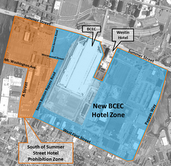Ban Lifted Allowing Up to Seven Hotels to be Built Close to Boston Convention & Exhibition Center

Another hurdle recently was cleared that would allow more meeting and trade show business to come into the Boston Convention & Exhibition Center, with the Massachusetts State Legislature passing an annual budget bill that included language lifting a ban on building any hotels south of Summer Street next to the venue.
The ban was first enacted in 1997 to assuage concerns by South Boston residents of the impact too many hotels would have on the neighborhood.
After several community meetings and talks with local legislators and leaders, the new language passed by the state legislature lifts the ban, allowing no more than seven hotels to be built in the new zone.
According to Jim Rooney, executive director of the Massachusetts Convention Center Authority, during the next three to five years several hotel projects could be initiated.
“It is hoped that a headquarters hotel of 1,000-plus rooms and one to two mid-priced hotels of up to 500 rooms could be constructed in the new zone,” Rooney said.
He added, “The language in the new legislation limits the number of total rooms built in the new zone to 2,700.”
The need for hotel rooms near the center is crucial since most attendees are bused in from other areas of the city costing shows such as the BIO International Convention an extra $1 million in transportation fees it wouldn’t have to pay in other cities, Rooney said.
Even though Boston was ranked No. 8 out of the top 10 shows with seven shows on the 2011 TSNN Top 250 Trade Show list, the possibility of snagging more business has been hobbled by not only the lack of hotel rooms near the center, but also the size of the center itself.
The Boston Convention & Exhibition Center currently has 516,000 square feet of exhibit space, but plans are on the table to expand it by 335,000 to 400,000 square feet of exhibit space and 105,000 to 125,000 square feet of meeting space, as well as adding a 70,000 to 75,000 square foot ballroom.
The plan also includes adding hotel room space, which now is a possibility with the recent ban lifted.
The goal of the $2 billion expansion plan, called the “Top 5 Campaign”, is to make Boston a top five destination in the North American convention and meetings industry, according to MCCA officials.
In order to add the extra hotel rooms, though, the center needs to purchase more nearby land. According to recent local press reports that, too, is in the works with the MCCA planning to spend $33 million to buy a tract near the center.
The MCCA would not confirm the local press reports.


Add new comment